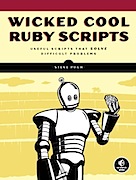 The development team behind the time tracking site freckle, have just released a PDF guide detailing the terminology and processes behind processing credit card details in Ruby.
The development team behind the time tracking site freckle, have just released a PDF guide detailing the terminology and processes behind processing credit card details in Ruby.
Much like Amy Hoy’s previous guides relating to Rails, the Jump Start Credit Card Processing guide is a very colorful guide and is split into three small parts that make it easy to digest. It gives an overview of the process and actions involved in processing credit card payments as well as explaining different methods that can be used to validate a credit card. A 6 step example in Ruby using the Active Merchant gem shows you the basic steps required to process payments. Read More













 So here we are right in the down period between Christmas and the start of the New Year. Few big releases or new developments come out at this time of the year, so it’s a good time to either enjoy time offline or.. to get reading some insightful articles we wouldn’t normally have time for! Luckily a few Rubyists have been busy spending the end of December putting together some rather good articles.. so get reading:
So here we are right in the down period between Christmas and the start of the New Year. Few big releases or new developments come out at this time of the year, so it’s a good time to either enjoy time offline or.. to get reading some insightful articles we wouldn’t normally have time for! Luckily a few Rubyists have been busy spending the end of December putting together some rather good articles.. so get reading: The Government of Fukuoka Japan, together with the Fukuoka Ruby Award Selection Committee, is running the
The Government of Fukuoka Japan, together with the Fukuoka Ruby Award Selection Committee, is running the  Apologies for the buzzword collision in the title, but
Apologies for the buzzword collision in the title, but 